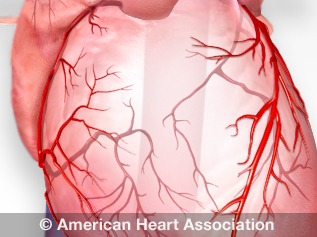Coronary Artery Calcium Test
Quick Facts
- A coronary artery calcium test is a heart scan.
- It shows calcium deposits in the coronary arteries.
- Your calcium score can help your health care team with treatment decisions.
What is a Coronary Artery Calcium Test?
A coronary artery calcium (CAC) test is a kind of heart scan. X-rays take detailed images of the arteries that supply blood to the heart muscle. The images show any calcium deposits in your coronary arteries. Higher amounts of calcium in the arteries suggest more severe disease.
See an illustration of coronary arteries
Why do people have it done?
A CAC test measures the calcium in your heart arteries. This calcium score gives your health care team an idea of:
- How much plaque is in your heart arteries
- Your risk of a future heart attack
- Congenital heart disease
- Problems with heart valves
- Artery blockages
- Tumors or masses of the heart
- Pumping function of the heart
- People unsure about statin therapy and who want to understand the risk and potential benefits
- People concerned about taking statins again after stopping treatment due to side effects
- Men ages 55-80 or women 60-80 with few risk factors who question whether they would benefit from statin therapy
- People ages 40-55 with between a 5% and 7.5% 10-year risk for getting heart disease and they have risk factors that raise their risk
Calcium scoring isn’t recommended for people who don’t have heart disease symptoms and have a low risk of heart attack unless they have a strong family history of premature coronary heart disease. Calcium scoring won’t give extra information if you’ve already had a:
What are the risks of the CAC scan?
The scan exposes you to the same amount of radiation as a mammogram. Repeated exposure can have negative health effects such as increased cancer risk. Talk with your health care team about the safety and risks for any test.
Tell your health care team if you’re pregnant. The test may be delayed until after your pregnancy.
How do I prepare for the scan?
No special preparation is needed.
What happens during the test?
Technicians perform the CAC scan in hospitals or special outpatient clinics.
- Electrodes are attached to your chest to monitor your EKG. The EKG also helps the computer create clear pictures of your heart.
- When you’re ready, the table slowly moves inside the machine. The scanner arches around you but doesn’t touch you.
- The technician will watch you closely through a window. You can talk to them through an intercom.
- The technician will ask you to hold your breath for short periods.
- CT scanning takes about 10-15 minutes.
Are CAC scans covered by insurance?
The test isn't always covered by insurance. It can range in cost from about $100 to $400.
What happens after the CAC scan?
Your health care team will make an appointment to discuss the results and next steps with you.





